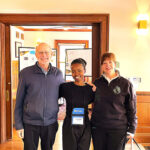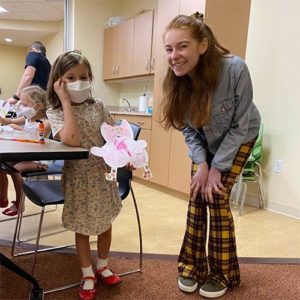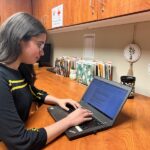
Social justice internship at a local church helps biology and anthropology major positively impact communities

A biology and anthropology major at The College of Wooster, Brianna Lyman ’23 dedicated her summer to an internship at the Trinity United Church of Christ. Part of her responsibilities as a social justice intern, Lyman assisted with the everyday operations of a service-based organization and received an opportunity to conduct public health research. Also completing the Digital & Visual Storytelling pathway, she hopes to continue creating a positive impact in communities around her by focusing on building rapports.
“I made connections and gained experience in networking and outreach, while strengthening my empathy by listening and trying to understand a person’s situation through their perspective.”
—Brianna Lyman ’23
How did you learn about the internship opportunity for your APEX Fellowship?
“The anthropology department advertised Trinity UCC as an institution where an internship would be supported by APEX funding. I talked to an APEX advisor, and learned that not only was an internship at Trinity eligible for the normal APEX fellowship funding but also for their new social justice program! This experience working under Kevan Franklin and others at Trinity has been beneficial and eye-opening to the issues facing the people of Wooster.”
What interests you most about the work you did?
“The thing that was the most interesting to me about the work I did is all the relationships I built, and how I now actively recognize people when I go out into the community, and they recognize me and express delight upon doing so. This made me feel good as I impacted them by having an active presence at the breakfast program, and several of Trinity’s or Trinity’s partner’s events. At this breakfast program, I had a role ‘behind-the-scenes’ working to help prepare, serve, and clean up breakfast. Eventually, I stepped outside my comfort zone and was fully present in the public room where I had conversations with community members. This helped me observe the interesting dynamics of the population. I volunteered for events such as ‘Reading under the Lights,’ planned for the Viola Starzman ‘Interactive Wellness Adventure,’ and got to help with an educational program at The Viola Startzman Clinic. I enjoy programming and interacting with kids but did not expect to do the same while working with Trinity. Getting to release my creative side and to spread the love of learning to kids was a pleasant surprise.”
Who was your fellowship mentor and how did they help you to succeed in this position?
“Brooke Krause, associate professor of economics and business economics, was present in all our group events and meetings, and was engaged with our experience. She has a past in social justice work and is passionate about it. She also developed a fun new way to complete the required APEX fellowship reflections by having us play with media using Flipgrid to create our own posts and generate new insights through interacting with others’ posts.”
 What are some skills you’ve learned that you see yourself carrying forward in your career?
What are some skills you’ve learned that you see yourself carrying forward in your career?
“Throughout this internship, I built courage by having to forego my shyness and actively pursuing people when I was curious about something or in need of information. Through practice, I made connections and gained experience in networking and outreach, while strengthening my empathy by listening and trying to understand a person’s situation through their perspective. All these ‘people-skills,’ I would reason, are beneficial in any career, even those that are isolated, as no one is truly successful on their own.”
How has the internship helped you to see what’s next for you?
“I do not believe my work for Trinity is truly done as I continue to strengthen these relationships I have found, and to develop new ones. I am hoping to return to Trinity in the future to continue to uphold a presence and help create a positive impact in the community. When it comes to my field of study, I hoped the internship would be public health based with a biological lens. However, I took an anthropological approach with my observations and field notes. I understood how crucial these observations were, and understandings of a population are critical in addressing health needs.”
Posted in Experiential Learning on August 15, 2022.
Related Posts
Related Areas of Study
Digital & Visual Storytelling
Tell stories using digital and visual media and find a career that fits your passion
PathwayBiology
Explore molecular and cellular biology, ecology and more with top faculty and access to extensive lab facilities.
Major MinorAnthropology
Use problem-solving and research skills to explore and understand communities and cultures in every part of the world.
Major Minor

